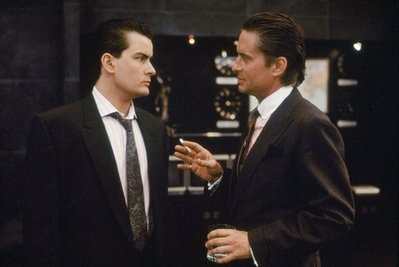


LOS ANGELES – "Greed, for lack of a better word, is good," Gordon Gekko famously assured us. "Greed is right. Greed works."
Greed can also make for memorable films in which characters want, need, desire, and will do whatever it takes to have it all. Sometimes they get in over their heads in their schemes — which always makes things juicier — as we see in this week's new release "Middle Men." Inspired by the true story of the origin of Internet porn, it's basically about a couple of guys who wanted to make a ton of money to buy more cocaine and hang out with gorgeous women at exclusive parties. Sounds reasonable.
Here are five other movies that should satisfy your desire for more-more-more:
• "Wall Street" (1987): Well, of course, where else would we start? Oliver Stone's classic epitomized the conspicuous-consumption mentality of the 1980s and provided Michael Douglas with one of his best-known characters and best-known lines. (People always get it wrong, though. Corporate raider Gordon Gekko never actually says "Greed is good" verbatim.) It also earned Douglas a best-actor Oscar, but truly, the slicked-back 'do alone could have sealed the award for him. And it's still relevant: The sequel, "Wall Street: Money Never Sleeps," is scheduled to hit theaters next month, starring Shia LaBeouf and featuring Douglas once more as Gekko, albeit with far less hair product.
• "Citizen Kane" (1941): Who better personified the drive for bigger and better and more stuff than Charles Foster Kane? Just take a look at Xanadu, the palatial estate crammed with all the crap the millionaire newspaper tycoon amassed. He rose from poverty and began his career as an idealist, but Kane's desire for more newspapers, power and influence became all-consuming, until he died alone and shrouded in mystery. It's the archetypal rise-and-fall story, and the larger-than-life persona of director, co-writer and star Orson Welles, both on screen and in real life, added to the intrigue. Plus, you know, it's largely considered the greatest film ever made. No biggie.
• "Fargo" (1996): One of the absolute best from Joel and Ethan Coen, it won two Academy Awards: for the brothers' original screenplay and for best-actress Frances McDormand as the plucky, persistent and extremely pregnant small-town sheriff Marge Gunderson. But the greed part comes from an inept scheme by car salesman Jerry Lundegaard, played by the tremendous William H. Macy, who arranges to have his wife kidnapped to collect the ransom. This does not go as planned. Darkly funny and starkly photographed by the great cinematographer Roger Deakins, "Fargo" is a film you can watch repeatedly and see something new each time. You betcha.
• "A Simple Plan" (1998): Similar aesthetically to "Fargo," with its beautifully bleak winter landscape and Minnesota setting. But whereas that was a neo-noir, this is an emotionally complex family drama — a great example of people who aren't as smart as they think they are getting into more trouble than they ever could have imagined. Bill Paxton and Billy Bob Thornton are equally excellent as brothers who discover $4 million in cash in a downed airplane. What should be a simple plan for the money ends up being anything but when greed and paranoia take hold. Director Sam Raimi ratchets up the tension as his characters make one bad decision, which leads to another, which leads to another ...
• "Scarface" (1983): We're going with the Brian De Palma version, not the 1932 Howard Hawks original, just because it's more fun. Admit it: You stop and watch it every time it's on while you're flipping channels. It's such a guilty pleasure it's irresistible — the clothes, the cars, the coke, that house with the giant, sunken bathtub and of course, the notoriously over-the-top performance from Al Pacino as drug lord Tony Montana. Like "Wall Street," it's an emblem of 1980s' wretched excess. After all, Tony is told that the world is his, so why shouldn't he want it all? Or as he so eloquently puts it: "In this country, you gotta make the money first. Then when you get the money, you get the power. Then when you get the power, then you get the women."
What more do you need?